EMBASSY OF PAKISTAN, PARIS, FRANCE
PRESS RELEASE
Paris September 5, 2024
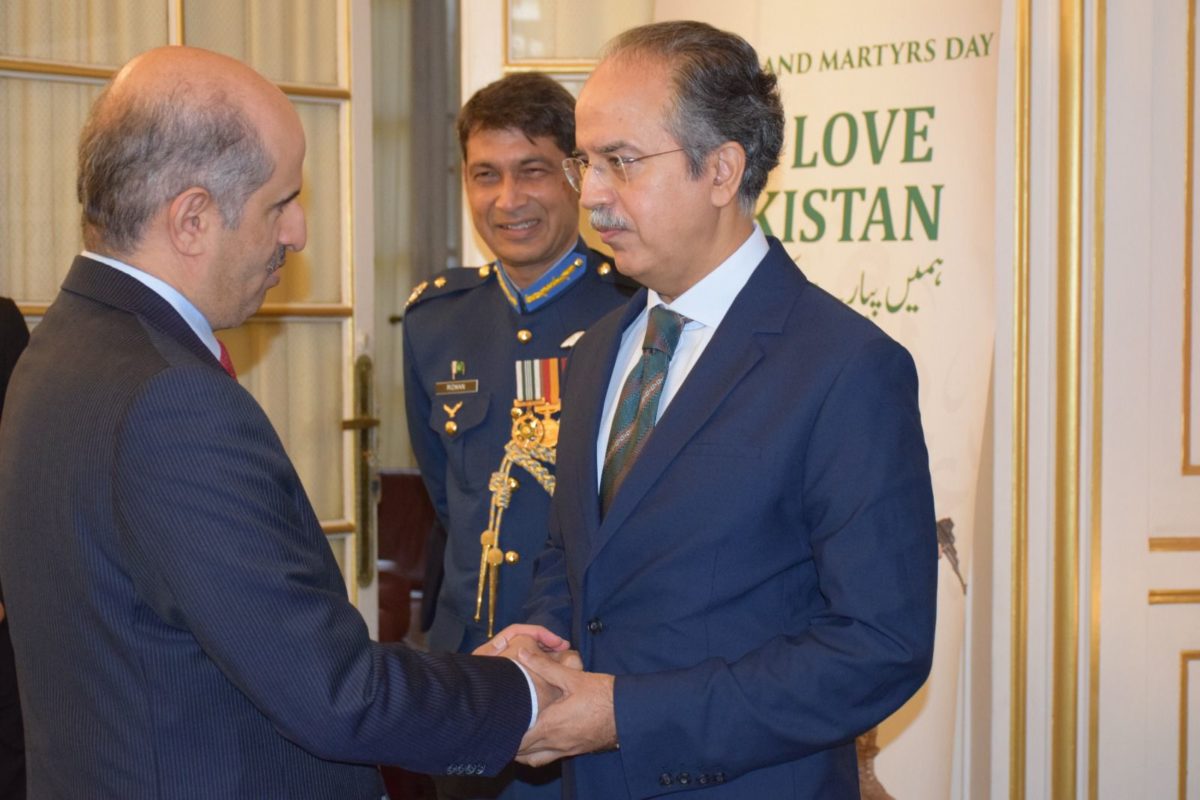
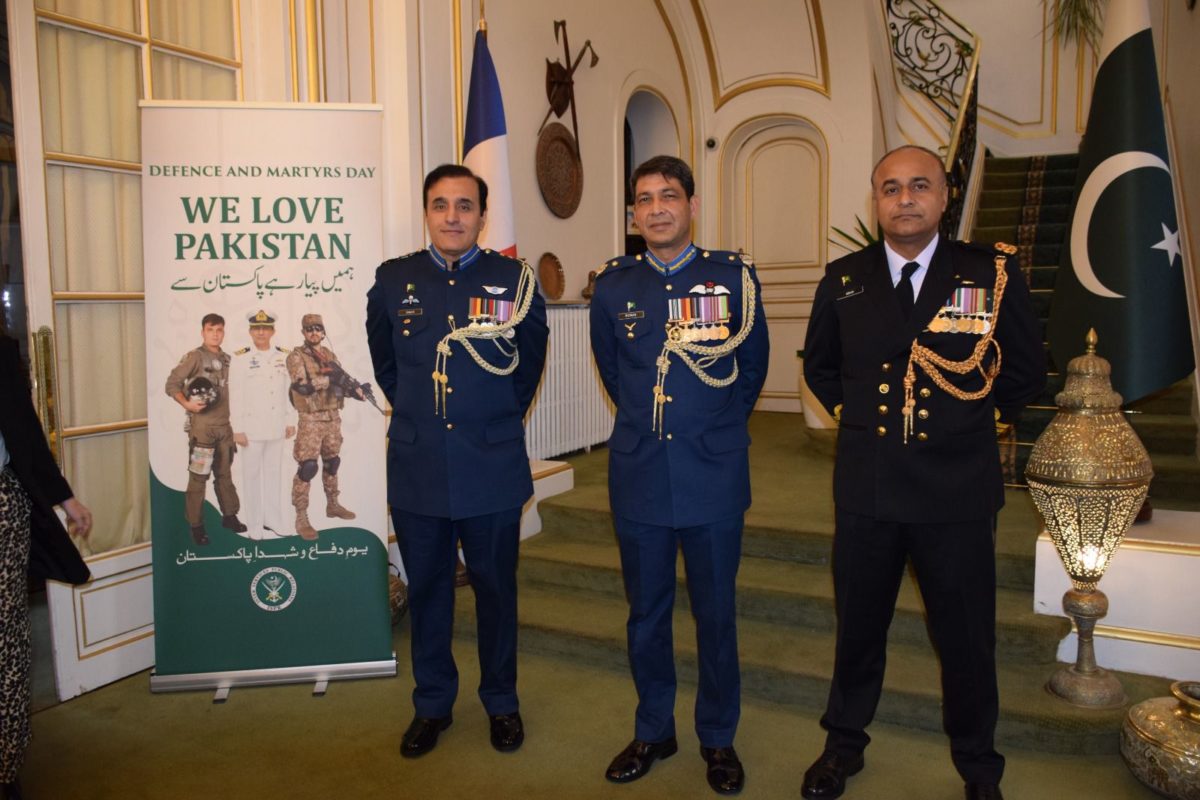
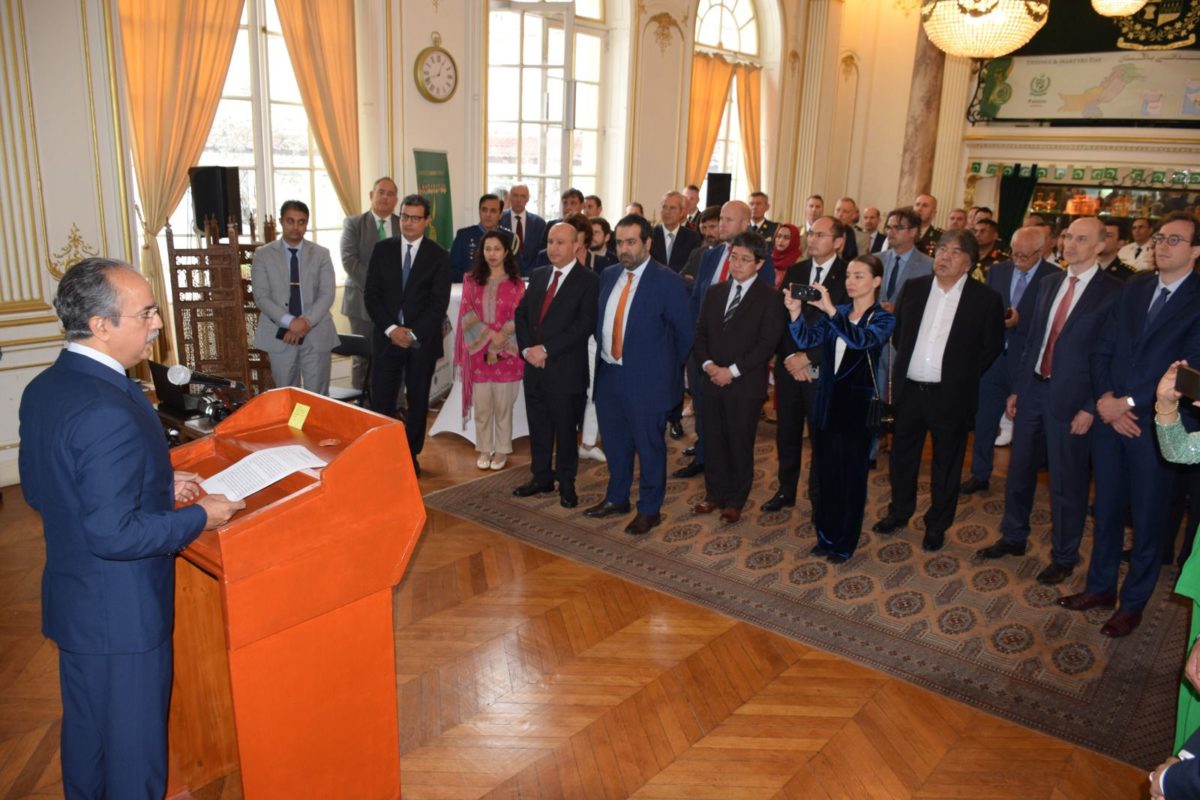
EMBASSY OF PAKISTAN, PARIS, FRANCE
PRESS RELEASE
Paris September 5, 2024



EMBASSY OF PAKISTAN, PARIS, FRANCE
(INFORMATION SECTION)
PRESS RELEASE
Paris August 14, 2024
Subject: Independence Day Celebrations of Pakistan – 14 August 2024
On the occasion of the 78th Independence Day of Pakistan, Ambassador Asim Iftikhar Ahmad hoisted national flag to the tune of the national anthem at the Embassy of Pakistan, Paris and welcomed distinguished members of the community and French friends including large number of children.
The messages of the President, the Prime Minister and Foreign Minister of Pakistan were read out on the occasion.
The Ambassador noted that 14th August was truly auspicious as it brought together the entire nation – in celebration, in paying homage to the Quaid-e-Azam and other leaders of the freedom movement, in remembrance of the supreme sacrifices of our forefathers, in honoring our heroes and drawing inspiration from our glorious past and the tremendous achievements over the decades. It was also a moment of reflection, of recognizing the challenges confronting us and seizing the immense opportunities presented to us.
Congratulating all on the Independence Day, the Ambassador said that we needed to draw guidance from the words of Quaid-e-Azam Muhammad Ali Jinnah when he said “If we want to make this great State of Pakistan happy and prosperous, we should wholly and solely concentrate on the well-being of the people, especially of the masses and the poor”. All segments of the society in particular women and youth had an important role to play in national development. He emphasized the value of collective and individual responsibility in upholding and promoting the image and prestige of Pakistan. Praising national hero Arshad Nadeem’s Olympics gold medal, he noted how the accomplishment of an individual can bring immense joy and pride for the nation and project the country’s name world-wide.
Ambassador Ahmad emphasized that as we celebrate our freedom we must not forget our Kashmiri and Palestinian brothers and sisters, who have been struggling for over seven decades against illegal occupation and oppression. Pakistan reaffirmed its complete solidarity and full support for the people of the Indian Illegally Occupied Jammu and Kashmir and Palestine for their freedom and right to self-determination.
Further, the Ambassador highlighted that Pakistan enjoys close cooperative relations with France and looked forward to Pakistani diaspora for further cementing the bond of friendship between the two countries. “We are proud of your hard work and accomplishments and consider you as true Ambassadors of Pakistan”, he said.
The Ambassador noted that Pakistan stood tall and proud in the comity of nations with significant contributions towards shared objectives of global peace, security and development. We, all Pakistanis, inside or outside Pakistan are committed to serve our country to the fullest. May the national flag always fly high as a symbol of peace, prosperity and progress!
Later, the guests enjoyed tableau prepared by children, national songs and traditional Pakistani food.
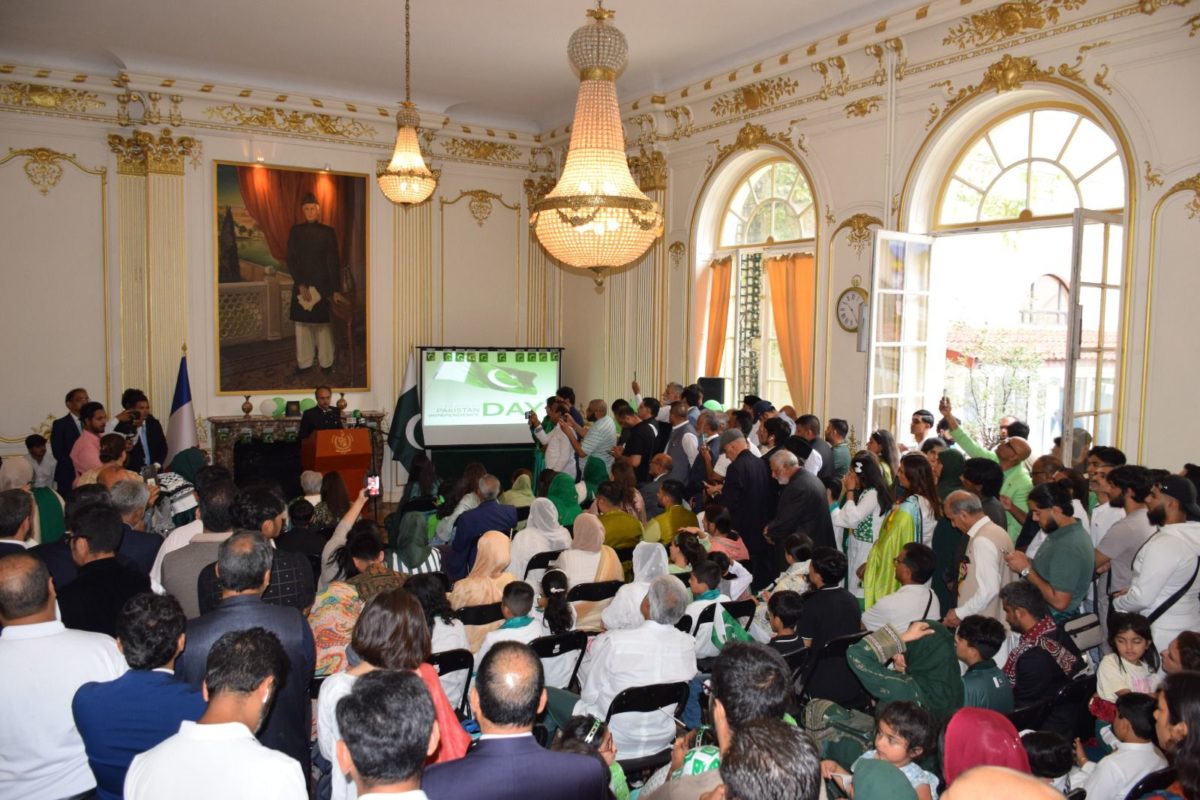
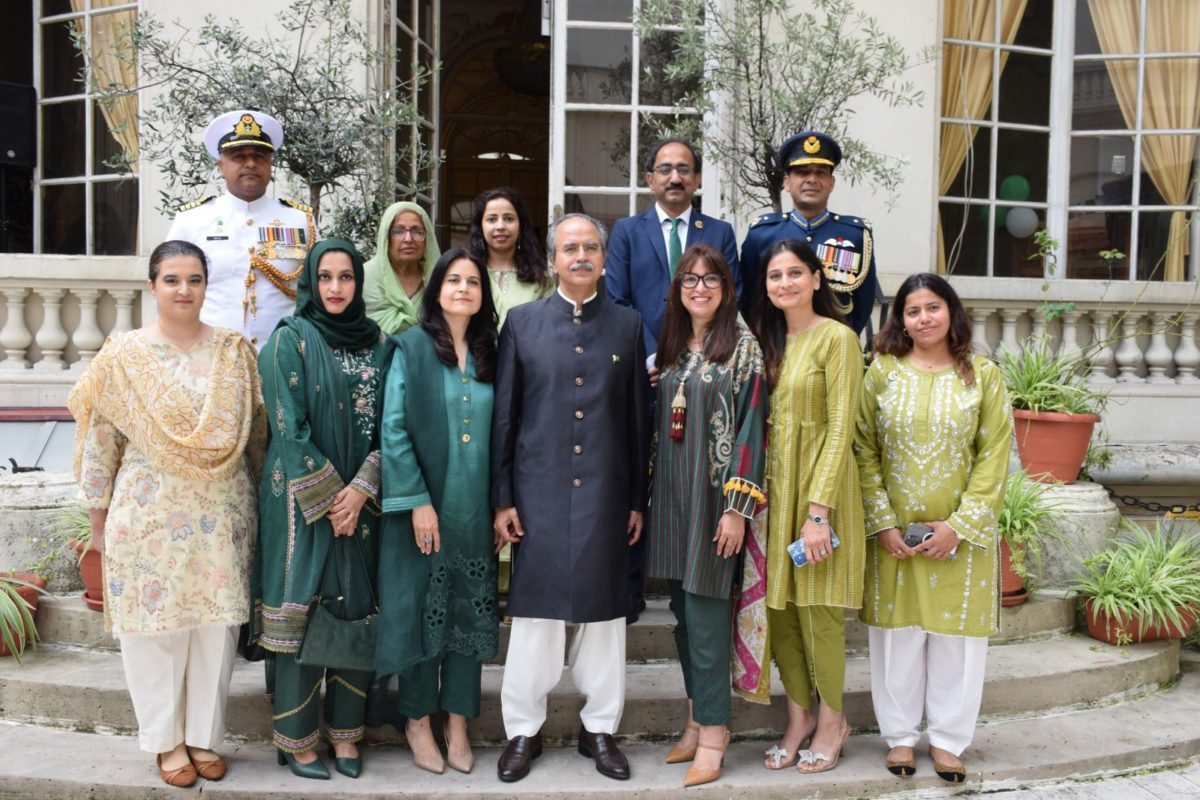
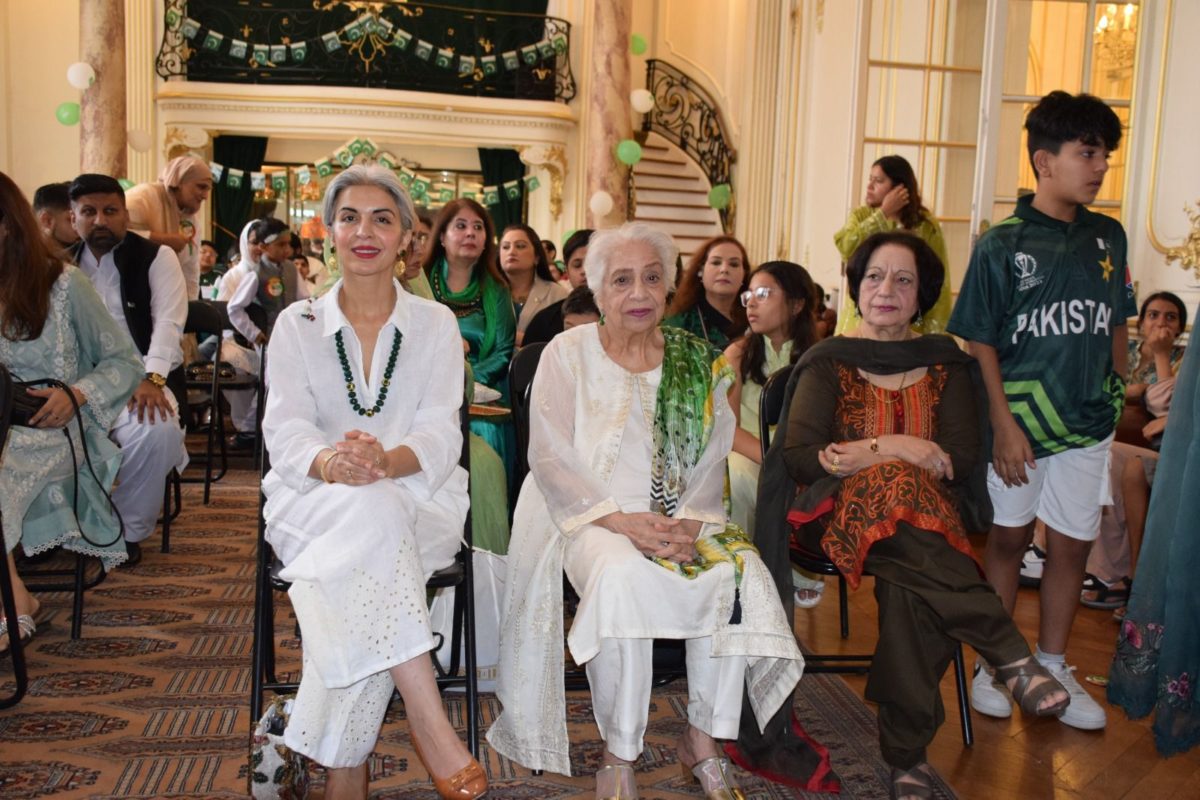
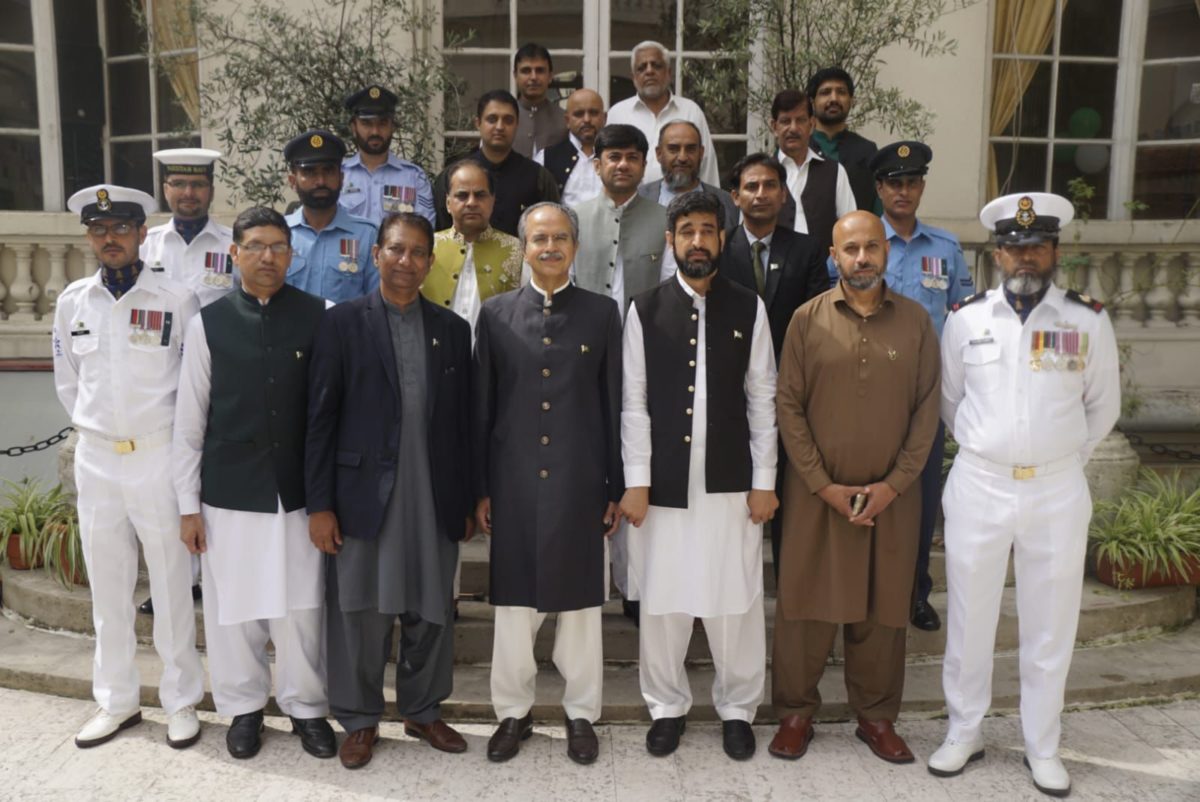
****
EMBASSY OF PAKISTAN, PARIS, FRANCE
(INFORMATION SECTION)
Subject: INTERNATIONAL WOMEN’S DAY CELEBRATED AT EMBASSY
PARIS: 12 March 2024
The Embassy of Pakistan, in collaboration with Zonta International Paris, co-organized a special event to celebrate the International Women’s Day. A large number of people from all walks of life including the diplomatic community, prominent representatives of the government, UNESCO, international institutions, civil society and media participated. Members of Pakistan-France Senate Friendship Group, Senator Vivette Lopez and Pierre Cuyper also attended.
In his remarks, Ambassador/Permanent Delegate Asim Iftikhar Ahmad highlighted the vital role of women in Pakistan’s independence and national development and paid tribute to their remarkable accomplishments in diverse fields over the years. Providing a historical perspective, the Ambassador also threw light on the central place of women in Islam that also provided an advanced and ahead of time framework of fundamental human rights including the rights of women. He also underlined Pakistan’s strong commitment to continue to strive for gender equality in all aspects of life and to provide an enabling environment for every girl and woman to achieve her full potential. Describing education as a key enabler, the Ambassador underscored the importance of partnerships including with the civil society to promote shared objectives. He also lauded the work of women officers spearheading various wings of the Embassy as a practical manifestation of government’s affirmative action for gender equality and representation.
A detailed presentation showcasing successful Pakistani girls and women from all walks of life throughout Pakistan’s history was also delivered during the event, reaffirming Pakistan’s solemn commitment to continue promoting women empowerment and gender equality across the board.
Assistant Director-General for Education Ms. Stefania Giannini highlighted the role of UNESCO in promoting SDG-4 Education globally. She also mentioned the Malala Funds in Trust Girls’ Right to Education Program as a successful role model of partnership between Pakistan, UNESCO other partners for promoting girls’ education in Pakistan and several other countries.
President of the Zonta Club presented the vision and activities of the organization for education, visibility and promotion of women and girls.
Recorded video messages from Ms. Sania Nishtar, CEO, GAVI and Ms. Mumtaz Zahra Baloch, Spokesperson, Ministry of Foreign Affairs were also played.
Three outstanding Pakistani-French women Tabassum Saleem (civil service), Naghmana Kiani (social service) and Shaaz Malik (poet/writer) also shared their views on the occasion.
The event was part of the Embassy’s program to mark the International Women’s Day coinciding with the Pakistan Day celebrations in March and was an excellent opportunity to inform the French audience of the tremendous achievements and important role of women in Pakistan.
****
EMBASSY OF PAKISTAN, PARIS, FRANCE
(INFORMATION SECTION)
PRESS RELEASE
PARIS: December 22, 2023
A Christmas Dinner was hosted at the Embassy of Pakistan, Paris on December 21, 2023. Ambassador of Pakistan Asim Iftikhar Ahmad welcomed the guests and thanked them for being part of the celebrations. He said that this coming together of people from different faiths, nationalities and backgrounds, is what makes this celebration of Xmas special.
He said that Christmas is a time of happiness, celebration, sharing and remembrance. More importantly it reminds us of the message of Jesus Christ – message of peace tolerance and compassion for everyone around the world. He added that by celebrating DIVERSITY – we promote harmony and tolerance – as this is a mosaic of our modern states, our societies and the global community.
The Ambassador further highlighted that it is the same message of peace common to all divine religions including that of Islam and our Prophet Muhammad’s (p.b.u.h.) universal teachings reflect the same. It goes without saying how important and relevant this universal message remains for the entire humanity today, he added. We are committed to promote harmony, ensure fundamental rights and equal opportunities for all Pakistanis as equal citizens as guided by the vision of our Founding Father – Quaid-e-Azam Muhammad Ali Jinnah.
The Ambassador appreciated the contributions of the Pakistani Christian community both in Pakistan and abroad where they are the key pillars of Pakistani diaspora. The Christian community remain proud contributors towards the establishment of Pakistan going back to 1947 – and decades of nation building ever since. They are and will always remain an essential and integral part of our multicultural society.
While outlining the active role of Pakistan at the international level the Ambassador duly recognized many friends who have over the years worked with Pakistan in building bridges across nations and civilizations.
The Ambassador also shared that the UN General Assembly had recently unanimously adopted the traditional resolution jointly presented by the Philippines and Pakistan on the “Promotion of inter-religious and inter cultural dialogue, understanding and cooperation for peace”.
The Christmas Dinner was attended by large number of French friends and families, Pakistani Christian community, diplomats and people from all walks of life. Guests were treated with traditional Pakistani food while goody bags brought more smiles to the children.
The officers and staff of the Embassy also attended the event marking Christmas celebrations.
****
Embassy of Pakistan
Paris, France
***
Press Release
Pakistan re-elected to UNESCO Executive Board for 2023-2027
Pakistan was re-elected today to the Executive Board of the United Nations Educational, Scientific and Cultural Organization (UNESCO) for the term 2023-2027. Pakistan wishes to thank Member States for their support and the confidence reposed in its candidature. It is a matter of immense pride to have been entrusted with the responsibility to serve on the Executive Board. Pakistan will avail this opportunity to continue to contribute to the policymaking, development of norms, advancement of global priorities, and effective oversight of programs and activities of the Organization.
Pakistan values the ever-relevant and crucial role of UNESCO as a universal forum to promote the intellectual and moral solidarity of mankind and advancement of global peace and development through education, science, culture and communication. As an ardent advocate of multilateralism, Pakistan will endeavour to strengthen our collective efforts at UNESCO, including by building bridges across regions and forging consensus on key issues for tangible outcomes and impact on ground. As a partner, Pakistan will continue to extend proactive support for the SIDS Operational Strategy and Global Priorities – Africa and Gender Equality.
Pakistan’s re-election is a testament to its longstanding support for and constructive role at the United Nations. Pakistan will continue to work with all Member States to strengthen UNESCO’s mandate and advance our shared goals.
Paris, 15 November 2023
******
Embassy of Pakistan
France
*****
Press Release
Independence Day Celebrations
Paris: August 14, 2023
An impressive flag hoisting ceremony at the Embassy of Pakistan marked the 76th Independence Day celebrations in France. Ambassador Asim Iftikhar Ahmad raised the Pakistani flag to the tune of the national anthem in the presence of distinguished members of the community, Embassy officials, friends and families including a large number of children. The messages of the President and the Prime Minister of Pakistan were read out on the occasion.
Congratulating the compatriots on the Independence Day, the Ambassador noted that such occasions were not only joyous but momentous as they provided the link between the past, present and the future, and thus an opportunity for collective national reflection.
It was the visionary leadership and indefatigable efforts of Quaid-e-Azam Muhammad Ali Jinnah that led to an independent homeland for Muslims, underlined the Ambassador while paying tribute to the Father of the Nation and other leaders of the freedom movement. He also paid homage to the immense sacrifice of our forefathers for the creation of Pakistan. That spirit of sacrifice continues to inspire the succeeding generations who have made the defence and security of Pakistan impregnable and one of the best in the world.
Appreciating the tremendous capabilities and hard work of Pakistani men and women, the Ambassador recalled how in the face of enormous challenges and lack of resources, the young nation had made great strides in all fields.
Also at the international stage, Pakistan held an important place among the comity of nations, playing its due role for the promotion of regional and global peace and development. Pakistan enjoys close cooperative relations with a wide circle of friends and partners around the world, including France.
Ambassador Ahmad emphasized that while celebrating independence, it was also our duty to reiterate our firm commitment and all out support to our Kashmiri brothers and sisters to realize their right to self-determination and freedom from illegal Indian occupation.
Going forward, the entire nation must work together – in unity, faith and discipline – for a stronger, prosperous and democratic Pakistan for our future generations to fully realize their aspirations. Pakistan was a gift of Allah for which we are thankful, and would safeguard this trust with utmost responsibility, stressed the Ambassador.
In this regard the Ambassador lauded the role and services of overseas Pakistanis and hoped that the dynamic Pakistani community in France will continue to contribute to strengthening Pak-France relations and bring more laurels to their motherland. He also praised the role of women and youth in national development.
The colourful Independence Day program included national songs, speeches and captivating tableau by children. The guests also enjoyed national songs and traditional Pakistani food.
The Ambassador also presented letters of appreciation to Pakistani poets and authors based in France in recognition of their recently published works in Urdu and Punjabi.
****
Embassy of Pakistan
(France)
****
Press Release
Youm-e-Istehsal-e-Kashmir observed in Paris
Paris; August 5, 2023
Embassy of Pakistan organized a seminar here today to observe Youm-e-Istehsal-e-Kashmir.
Ambassador Asim Iftikhar Ahmad underscored the significance of this day, commemorating four years since August 5, 2019, when India took illegal and unilateral actions, in violation of United Nations Security Council resolutions on Jammu and Kashmir and international law, with the aim of altering the internationally recognized disputed status of Indian Illegally Occupied Jammu and Kashmir (IIOJK).
Pakistan and the international community joined the Kashmiris in raising a unified voice and unequivocally rejecting India’s attempts to change the demographic structure of the occupied territory in contravention of the UNSC resolutions and the 4th Geneva Convention. The Ambassador emphasized that India’s sinister designs and perpetration of grave human rights violations to suppress the spirit of the Kashmiri people and undermine their legitimate right to self-determination had utterly failed.
Paying tribute to the sacrifices of the Kashmiri people, the Ambassador admired their unwavering commitment and strong determination to continue their rightful struggle for self-determination and freedom from Indian occupation. He lauded that despite India’s relentless repression, including extra-judicial killings, severe restrictions on freedom of speech, fake encounters, cordon-and-search operations, custodial torture and deaths, enforced disappearances, incarceration of Kashmiri leaders and youth, use of pellet guns, destruction of homes, and other oppressive methods, the brave and resilient Kashmiri people remained resolute.
The Ambassador deliberated on the political, legal, peace and security, humanitarian and human rights dimensions of the Jammu and Kashmir dispute between India and Pakistan, that remains on the agenda of the UN Security Council since 1948. It was high time for the international community to play its role in resolving the dispute in accordance with the relevant UN Security Council resolutions and the wishes of the Kashmiri people. The Government and people of Pakistan stand in complete solidarity with the people of IIOJK and will continue to extend all possible support for the realization of their right to self-determination. He emphasized that India must stop human rights violations and reverse the illegal actions of August 5, 2019 and all subsequent measures to create an environment for meaningful dialogues to resolve the Jammu and Kashmir dispute.
During the seminar, various speakers strongly condemned the Indian government’s unlawful actions and the increased and widespread violations of human rights and international humanitarian law in IIOJK, particularly since August 5, 2019, and expressed their unwavering support and solidarity to the Kashmiri people in their just struggle.
A compelling documentary highlighting the atrocities committed in IIOJK was screened and messages from the President, Prime Minister, and Foreign Minister were read out, affirming Pakistan’s support for the Kashmir cause.
As part of the commemoration, an exhibition of photographs and illustrations was organized at the chancery, that showcased powerful images depicting the Kashmiri struggle against the Indian military siege and the atrocities committed in IIOJK.
Earlier a webinar was held in connection with Youm-e-Istehsal in which Ambassador Asim Iftikhar Ahmad also participated. Speakers condemned India’s illegal and unilateral actions of August 5, 2019 and grave violations of HR in IIOJK. They expressed unanimous support for Kashmiris right to self-determination in accordance with UNSC resolutions.
Subsequently, members of the Pakistani and Kashmiri communities organized a protest rally near the iconic Eiffel Tower. During the rally, speakers strongly condemned the Indian government’s human rights violations and illegal actions in IIOJK and called for resolution of the Jammu and Kashmir dispute in line with the resolutions and wishes of the Kashmiri people.
The protestors fervently raised slogans against the forced occupation of IIOJK, while brandishing placards, banners, and Kashmiri flags, symbolizing their unwavering support for the Kashmir cause.
————
Message by Prime Minister of the Islamic Republic of Pakistan on Kashmir Solidarity Day (5 February 2023)
Every year, on the fifth of February, the people of Pakistan reaffirm their solidarity with their Kashmiri brothers and sisters. On this Kashmir Solidarity Day, we renew our commitment of our unflinching support to them in their just struggle for inalienable right to self-determination.
The Jammu and Kashmir dispute is one of the oldest, unresolved items on the agenda of the United Nations. Over the last seventy-five years, India has continued its illegal occupation of Jammu and Kashmir and suppressed its people. Thousands of Kashmiris have sacrificed their lives and suffered countless atrocities at the hands of the Indian Occupation Forces. The already bad situation took a turn for the worst following India’s illegal and unilateral actions of 5 August 2019. These illegal and unilateral steps have been rejected by Pakistan and the Kashmiris.
The human rights situation in Indian Illegally Occupied Jammu & Kashmir (IIOJK) remains a source of grave concern to Pakistan and the rest of the world. India has brazenly targeted Kashmiri men, women and children through curfews, blackouts, arbitrary detention, imprisonment, and denial of basic rights. The popular Kashmiri political leadership has been illegally detained or deliberately victimized through fictitious cases. The media has been silenced through coercion and religious scholars have been arrested. Draconian laws have been enacted that deny the fundamental freedoms of the Kashmiri people.
India has also intensified its campaign to bring about demographic changes in IIOJK, so as to convert the Kashmiris into a minority in their own land. These actions are in violation of UNSC resolutions and international law, including the 4th Geneva Convention.
India is mistaken if it believes it can crush the iron will of the Kashmiri people. No amount of state terrorism, unleashed by Indian Occupation Forces, can break the will of the Kashmiris or undermine their legitimate struggle.
We urge India to honour its commitments made to Pakistan, the UN and, above all, to the Kashmiri people.
On behalf of the entire Pakistani nation, I want to assure our Kashmiri brothers and sisters that we stand shoulder to shoulder with them. We will continue to lend moral, diplomatic and political support to their just cause, until they attain freedom from Indian oppression. Pakistan will also continue to raise its voice at all international platforms and highlight India’s barbaric actions in IIOJK.
****